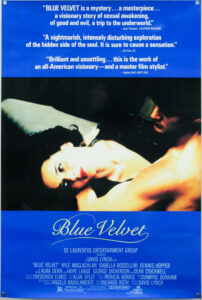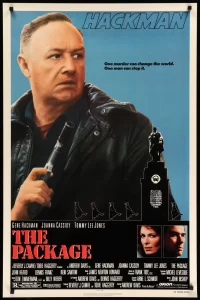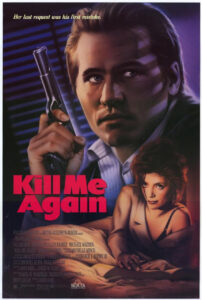
In this edition of “I Wake Up Streaming,” novelist William Boyle rounds up his top streaming picks for the month of April. The column’s name is a play on the 1941 film I Wake Up Screaming, starring Betty Grable, Victor Mature, and Carole Landis. While the film’s title hits a pleasing note of terror and despair, changing that one letter speaks to the joy of discovering new films and rediscovering old favorites, as well as the panic that comes with being overwhelmed by options.
Blue Velvet (Max)
 David Lynch was and is my greatest artistic hero. His death earlier this year hit hard. I think the main reason I haven’t written a new column in several months is because I’m not sure how to reckon with his loss. In the wake of such profound loss, however, there is a positive byproduct: disappearing in the work. And that’s what I did after Lynch died, even as the country seemed to be falling apart at hyperspeed: I rewatched his movies and shows; I listened to his albums; I read his books; I looked at his paintings. And, of course, I thought back to the time I first discovered his work, the impact of it. The first Lynch film I encountered was Blue Velvet. I was twelve years old. I had fallen in love with movies at a young age, but twelve was right around the time that my taste really started to take shape. It was also the time that I began to devote myself fully to studying movies (whether I knew that’s exactly what I was doing or not). My local video store had a rent-three-for-the-price-of-two deal. I would partake in that deal with great frequency, aiming to rent twelve movies a week if possible, watching, learning, immersing myself in everything from classics to trashy exploitation flicks. I didn’t have anyone guiding me, was just sort of taking chances on things, finding actors I liked, probably just at the beginning of wanting to explore filmographies of directors and actors I responded to. I’m not sure what made me pick up Blue Velvet one Saturday morning in the summer of 1991. It was my Saturday routine to go to the video store as soon as they opened at eleven, to return my previous rentals, and to get three movies. Lynch must’ve been in the air. Much to my chagrin, I hadn’t seen Twin Peaks when it was on television (it had just ended its short run in June of that year), but I had almost certainly read about it in one of the magazines I subscribed to, Entertainment Weekly or Premiere. I feel certain that my curiosity about Lynch must’ve been piqued somehow. In any case, I grabbed Blue Velvet as one of my three rentals (I don’t remember what the other two were that day because Blue Velvet made them irrelevant), and I went home. I put the tape into my top-loading VCR and entered the world of the movie. I’d like to say I can remember everything about how I reacted to what I saw that afternoon—Kyle MacLachlan’s Jeffrey finding that ear in the field and then meeting Laura Dern’s Sandy and bringing her along as he spied on Isabella Rossellini’s Dorothy Vallens; the terrifying entrance and overall scary-as-shit presence of Dennis Hopper’s Frank Booth—but I think I simply watched with a numb excitement. This was different. What I do remember is going to Saturday mass with my mother and grandparents later in the day. It’s not a lie or exaggeration to say that my vision of the world was forever altered. There was the time before Blue Velvet and the time after. I felt as if I’d seen behind the curtain. Not to be overdramatic, but it was the end of a certain kind of innocence for me—I mean that in the best way possible. I’d had dramatic responses to films before (Hitchcock’s The Birds haunted my dreams, for instance), but I’d never had a movie change me in my blood. I’d see Wild At Heart soon after that (and fall in love with Barry Gifford’s novel) and then I’d watch the earlier Lynch films I hadn’t seen yet and see his new ones as they came out (including Twin Peaks: Fire Walk With Me, which I watched before I finally had a chance to see the show when I went away to college at eighteen). I’d see Mulholland Drive at a theater in Austin, Texas, after moving there in 2001, watching from a private room within the theater that was accessed through saloon doors while a man in cowboy boots stood outside the room for the entirety of the runtime—that was memorable. But I often think about that first earth-shattering encounter with Blue Velvet. I was trying to put myself back there on this most recent rewatch—trying to call up precisely what I must’ve felt watching it at twelve. Nervous? Thrilled? The movie still feels dangerous and beautiful and mysterious in ways it’s difficult to articulate. I’m beyond sad that Lynch is gone but just so thankful for his work and to have existed on the same planet as him for a good long while.
David Lynch was and is my greatest artistic hero. His death earlier this year hit hard. I think the main reason I haven’t written a new column in several months is because I’m not sure how to reckon with his loss. In the wake of such profound loss, however, there is a positive byproduct: disappearing in the work. And that’s what I did after Lynch died, even as the country seemed to be falling apart at hyperspeed: I rewatched his movies and shows; I listened to his albums; I read his books; I looked at his paintings. And, of course, I thought back to the time I first discovered his work, the impact of it. The first Lynch film I encountered was Blue Velvet. I was twelve years old. I had fallen in love with movies at a young age, but twelve was right around the time that my taste really started to take shape. It was also the time that I began to devote myself fully to studying movies (whether I knew that’s exactly what I was doing or not). My local video store had a rent-three-for-the-price-of-two deal. I would partake in that deal with great frequency, aiming to rent twelve movies a week if possible, watching, learning, immersing myself in everything from classics to trashy exploitation flicks. I didn’t have anyone guiding me, was just sort of taking chances on things, finding actors I liked, probably just at the beginning of wanting to explore filmographies of directors and actors I responded to. I’m not sure what made me pick up Blue Velvet one Saturday morning in the summer of 1991. It was my Saturday routine to go to the video store as soon as they opened at eleven, to return my previous rentals, and to get three movies. Lynch must’ve been in the air. Much to my chagrin, I hadn’t seen Twin Peaks when it was on television (it had just ended its short run in June of that year), but I had almost certainly read about it in one of the magazines I subscribed to, Entertainment Weekly or Premiere. I feel certain that my curiosity about Lynch must’ve been piqued somehow. In any case, I grabbed Blue Velvet as one of my three rentals (I don’t remember what the other two were that day because Blue Velvet made them irrelevant), and I went home. I put the tape into my top-loading VCR and entered the world of the movie. I’d like to say I can remember everything about how I reacted to what I saw that afternoon—Kyle MacLachlan’s Jeffrey finding that ear in the field and then meeting Laura Dern’s Sandy and bringing her along as he spied on Isabella Rossellini’s Dorothy Vallens; the terrifying entrance and overall scary-as-shit presence of Dennis Hopper’s Frank Booth—but I think I simply watched with a numb excitement. This was different. What I do remember is going to Saturday mass with my mother and grandparents later in the day. It’s not a lie or exaggeration to say that my vision of the world was forever altered. There was the time before Blue Velvet and the time after. I felt as if I’d seen behind the curtain. Not to be overdramatic, but it was the end of a certain kind of innocence for me—I mean that in the best way possible. I’d had dramatic responses to films before (Hitchcock’s The Birds haunted my dreams, for instance), but I’d never had a movie change me in my blood. I’d see Wild At Heart soon after that (and fall in love with Barry Gifford’s novel) and then I’d watch the earlier Lynch films I hadn’t seen yet and see his new ones as they came out (including Twin Peaks: Fire Walk With Me, which I watched before I finally had a chance to see the show when I went away to college at eighteen). I’d see Mulholland Drive at a theater in Austin, Texas, after moving there in 2001, watching from a private room within the theater that was accessed through saloon doors while a man in cowboy boots stood outside the room for the entirety of the runtime—that was memorable. But I often think about that first earth-shattering encounter with Blue Velvet. I was trying to put myself back there on this most recent rewatch—trying to call up precisely what I must’ve felt watching it at twelve. Nervous? Thrilled? The movie still feels dangerous and beautiful and mysterious in ways it’s difficult to articulate. I’m beyond sad that Lynch is gone but just so thankful for his work and to have existed on the same planet as him for a good long while.
The Package (Tubi)
 If I had to make a list of my favorite actors of all time, Gene Hackman would be vying for the top spot along with Gena Rowlands and Robert Duvall. Another recent monumental loss. The first Hackman movie I saw was Superman—that was a big one for me as a kid. Hoosiers followed soon after that. Hackman was always there, always someone whose work I responded to, but it probably wasn’t until I saw The French Connection in high school that I really fell hard for him. The famous chase in that film had been shot under the El in my southern Brooklyn neighborhood and made me proud. Plus, Hackman’s Popeye Doyle was my kind of character—multidimensional, complex, dark, angry—and Hackman wasn’t some pretty boy playing mean. You believed him. When I was in my early twenties, I saw Scarecrow with Hackman and Al Pacino as drifters, which remains my favorite turn by Hackman and one of my favorite films. There are so many great Hackman performances—he was always top-notch, even in pictures that weren’t—that it’s hard to point to just one here. Many of my go-tos aren’t currently streaming and others seem too obvious. Since he passed away, I’ve rewatched ten Hackman favorites, many on Blu-ray, a few streaming, and I’ve also seen a couple I’d somehow managed to miss along the way (Heartbreakers, Welcome to Mooseport). I’m writing about Andrew Davis’s The Package from 1989 because it’s one that not enough folks know or remember, and it’s a performance that sums up Hackman’s appeal perfectly. The Package is Davis’s precursor to his 1993 smash hit The Fugitive, and it has a lot in common with that picture (Chicago, Tommy Lee Jones, similar chase elements). Hackman plays Johnny Gallagher, a Green Beret sergeant tasked with escorting a prisoner (Jones) back to the United States. When the prisoner escapes, Gallagher realizes there’s more to the story than meets the eye and starts to unravel a conspiracy that will put his life and the lives of people he loves in danger. Hackman’s chemistry with Joanna Cassidy, who plays his ex-wife Eileen, as well as his chemistry with an old friend, Chicago cop Lieutenant Milan Delich (played by Dennis Franz), really make the whole thing hum. I remember seeing The Package on VHS in the early nineties, but this viewing felt especially revelatory. It’s a film that should be as celebrated as The Fugitive, in large part because of Hackman’s electric performance.
If I had to make a list of my favorite actors of all time, Gene Hackman would be vying for the top spot along with Gena Rowlands and Robert Duvall. Another recent monumental loss. The first Hackman movie I saw was Superman—that was a big one for me as a kid. Hoosiers followed soon after that. Hackman was always there, always someone whose work I responded to, but it probably wasn’t until I saw The French Connection in high school that I really fell hard for him. The famous chase in that film had been shot under the El in my southern Brooklyn neighborhood and made me proud. Plus, Hackman’s Popeye Doyle was my kind of character—multidimensional, complex, dark, angry—and Hackman wasn’t some pretty boy playing mean. You believed him. When I was in my early twenties, I saw Scarecrow with Hackman and Al Pacino as drifters, which remains my favorite turn by Hackman and one of my favorite films. There are so many great Hackman performances—he was always top-notch, even in pictures that weren’t—that it’s hard to point to just one here. Many of my go-tos aren’t currently streaming and others seem too obvious. Since he passed away, I’ve rewatched ten Hackman favorites, many on Blu-ray, a few streaming, and I’ve also seen a couple I’d somehow managed to miss along the way (Heartbreakers, Welcome to Mooseport). I’m writing about Andrew Davis’s The Package from 1989 because it’s one that not enough folks know or remember, and it’s a performance that sums up Hackman’s appeal perfectly. The Package is Davis’s precursor to his 1993 smash hit The Fugitive, and it has a lot in common with that picture (Chicago, Tommy Lee Jones, similar chase elements). Hackman plays Johnny Gallagher, a Green Beret sergeant tasked with escorting a prisoner (Jones) back to the United States. When the prisoner escapes, Gallagher realizes there’s more to the story than meets the eye and starts to unravel a conspiracy that will put his life and the lives of people he loves in danger. Hackman’s chemistry with Joanna Cassidy, who plays his ex-wife Eileen, as well as his chemistry with an old friend, Chicago cop Lieutenant Milan Delich (played by Dennis Franz), really make the whole thing hum. I remember seeing The Package on VHS in the early nineties, but this viewing felt especially revelatory. It’s a film that should be as celebrated as The Fugitive, in large part because of Hackman’s electric performance.
Kill Me Again (Prime Video)
 More loss. Val Kilmer also recently passed away. When I was a kid falling in love with movies, Kilmer was another actor who was everywhere. Top Secret! Real Genius. Top Gun. Willow. The Doors. Tombstone. True Romance. Heat. So many all-timers. But, of course, with my penchant for film noir, it was John Dahl’s sneaky-great neo-noir Kill Me Again (also from 1989) that had a massive early impact on me (and pre-dated or predicted the early nineties neo-noir boom that was to come). In it, Kilmer plays a private eye in Reno named Jack Andrews, a handsome bastard but melancholy, with a real hangdog, Fred MacMurray quality. In the classic noir tradition, things change for Jack when a woman, Fay Forrester (Joanne Whalley, who was then Joanne Whalley-Kilmer) walks into his office, needing help. Except the help she needs is not of the typical variety. Fay hasn’t told Jack, but she’s run off with a briefcase full of cash that she and her psycho boyfriend, Vince (Michael Madsen), nabbed from the mob, and she wants Jack to help her fake her own death and create a new identity. For this service, she offers Jack ten grand, which will take care of the gambling debt that’s threatening his well-being. As you’d expect, things go bad fast. After successfully faking her death with Jack’s expert help, Fay takes off without paying the rest of his fee and Jack is hauled in by cops who find his name and number in a matchbook in Fay’s purse. Vince is also on his trail. John Dahl had one of the great runs ever with his neo-noir trilogy—this, Red Rock West, and The Last Seduction—and I wish he’d managed to make a dozen more movies in this vein. It’s a Kilmer performance that not enough people have seen, and it demonstrates the kind of range he had. Heat is one of my favorite movies. I’ve seen True Romance about three thousand times and quote his Elvis daily. Tombstone and The Doors might feature his most iconic performances. But Kill Me Again was the film I turned to first after hearing the news of his death. He seems to have absorbed lessons from all the film noir greats here. Just as he gives a haunted, possessed performance as Jim Morrison, he gives a haunted, possessed performance as Jack, except the dial is tuned differently, way down to a buzzy, coming-across-a-long-distance station. His Jack is a mournful, elegiac patsy—part MacMurray, with maybe a dash of John Garfield—and you want things to go right for him even as they keep going wrong.
More loss. Val Kilmer also recently passed away. When I was a kid falling in love with movies, Kilmer was another actor who was everywhere. Top Secret! Real Genius. Top Gun. Willow. The Doors. Tombstone. True Romance. Heat. So many all-timers. But, of course, with my penchant for film noir, it was John Dahl’s sneaky-great neo-noir Kill Me Again (also from 1989) that had a massive early impact on me (and pre-dated or predicted the early nineties neo-noir boom that was to come). In it, Kilmer plays a private eye in Reno named Jack Andrews, a handsome bastard but melancholy, with a real hangdog, Fred MacMurray quality. In the classic noir tradition, things change for Jack when a woman, Fay Forrester (Joanne Whalley, who was then Joanne Whalley-Kilmer) walks into his office, needing help. Except the help she needs is not of the typical variety. Fay hasn’t told Jack, but she’s run off with a briefcase full of cash that she and her psycho boyfriend, Vince (Michael Madsen), nabbed from the mob, and she wants Jack to help her fake her own death and create a new identity. For this service, she offers Jack ten grand, which will take care of the gambling debt that’s threatening his well-being. As you’d expect, things go bad fast. After successfully faking her death with Jack’s expert help, Fay takes off without paying the rest of his fee and Jack is hauled in by cops who find his name and number in a matchbook in Fay’s purse. Vince is also on his trail. John Dahl had one of the great runs ever with his neo-noir trilogy—this, Red Rock West, and The Last Seduction—and I wish he’d managed to make a dozen more movies in this vein. It’s a Kilmer performance that not enough people have seen, and it demonstrates the kind of range he had. Heat is one of my favorite movies. I’ve seen True Romance about three thousand times and quote his Elvis daily. Tombstone and The Doors might feature his most iconic performances. But Kill Me Again was the film I turned to first after hearing the news of his death. He seems to have absorbed lessons from all the film noir greats here. Just as he gives a haunted, possessed performance as Jim Morrison, he gives a haunted, possessed performance as Jack, except the dial is tuned differently, way down to a buzzy, coming-across-a-long-distance station. His Jack is a mournful, elegiac patsy—part MacMurray, with maybe a dash of John Garfield—and you want things to go right for him even as they keep going wrong.
William Boyle is the author of the novels Gravesend, The Lonely Witness, A Friend Is a Gift You Give Yourself, City of Margins, Shoot the Moonlight Out, and Saint of the Narrows Street. His novella Everything Is Broken was published in Southwest Review Volume 104, numbers 1–4, and he co-edited (with Claudia Piñeiro and Frances Riddle) the noir issue (Volume 108, number 3).
Illustration: Jess Rotter
